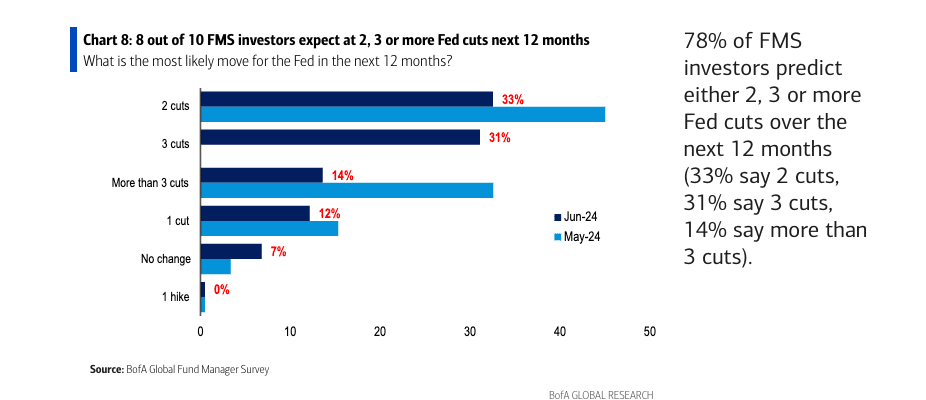–U.S. Election Jitters Rising
By Vicki Schmelzer
NEW YORK (MaceNews) – World investors largely kept allocations steady in June, with much hinging on Fed rate cuts expected later in the year and into 2025, according to BofA Global Research’s monthly fund manager survey, released Tuesday.
With lower rate expectations, inflation and growth outlooks improved on the month, the survey said.
In the June survey, 84% of those polled expected the Federal Reserve will lower interest rates in the second half of 2024, with 39% looking for cuts at the September 18 meeting.
In May, 82% looked for the first rate cut to be in the second half of this year.
A net 78% of investors predict that the Fed will cut two, three or more times in the coming 12 months.
On the growth front, 6% percent of portfolio managers looked for weaker economic growth in the coming year. This compared to a net 9% in May, and still in sharp contrast to April, where a net 11% of managers looked for stronger world growth.
Inflation projections further stabilized in June, with a net 57% looking for lower CPI in the next 12 months, up from a net 56% in May and a net 45% in April.
This month, managers only modestly tweaked their equity, bond and commodity allocations while embracing real estate.
In June, a net 39% of portfolio managers were overweight global equities, versus a net 41% overweight in May and a net 34% in April.
A net 17% of mangers were underweight bonds this month, compared to a net 6% underweight in May and a net 14% underweight in April.
This month, commodity holdings stood at a net 6% overweight, versus a net 13% overweight in May and a net 11% overweight in April.
Allocation to real estate rose to a net 23% underweight from a net 28% underweight in May and compared to a net 15% underweight in April.
Average cash balances were unchanged at 4.0% in June and compared to 4.2% in April.
Allocation to cash flipped to a net 6% underweight on the month, compared to a net 3% overweight in May and a net 9% underweight in April.
On regional asset allocation, the eurozone and UK saw inflows while the U.S., emerging markets and Japan saw outflows.
Allocation to U.S. equities stood at a net 7% overweight in June, versus a net 12% overweight in May and compared to a net 9% overweight in April.
This month, a net 30% of managers were overweight eurozone stocks, compared to a net 18% overweight in May and compared to a net 26% overweight in April.
Allocation to global emerging markets (GEM) was held at a net 1% overweight in June down from a net 4% overweight in May and April.
Allocation to Japanese equities fell to a net 4% overweight this month, down from a net 20% overweight in May and a net 23% overweight in April, while UK allocation rose to a net 12% underweight from a net 14% underweight in May and a net 17% underweight in April.
In June, the biggest “tail risks” feared by portfolio managers were: “Higher inflation” (32% of those polled), “Geopolitics” (22%), “US Election” (16%), “Economic hard landing” (14%), “Systemic credit event” (9%) and “AI bubble” (5%)
In May, the biggest “tail risks” were: “Higher inflation” (41% of those polled), “Geopolitics” (18%), “Economic hard landing” (15%), “US election” (9%), “Systemic credit event” (8%), AI bubble” (4%) and “Asia FX war” (2%).
With U.S. election jitters nearly doubling in June, fund managers were asked which policy areas would be most affected by the November election.
Of those polled this month, 38% said trade, 20% said geopolitics, 13% said immigration, 9% said taxation, 7% said government spending and 6% said energy would be most affected.
In June, the “most overcrowded” trades were deemed: “Long Magnificent Seven” (69% of those polled), “Short China equities” (8%), “Long Gold” (8%), “Long US dollar” (5%), “Long bitcoin” (3%) and “Long European equities” (1%).
In May, the “most crowded” trades were: “Long Magnificent Seven” (51% of those polled), “Long US dollar” (12%), “Short China equities” (11%), “Long Japan equities” (9%), “Long bitcoin” (6%) and “Short REITs” (3%).
Note: the term “Magnificent Seven” was coined by Bank of America’s chief investment strategist Michael Hartnett, referring to a basket of the seven major tech stocks: Apple, Microsoft, Amazon, NVIDIA, Alphabet, Tesla and Meta.
An overall total of 238 panelists, with $721 billion in assets under management, participated in the BofA Global Research fund manager survey, taken June 7 to June 13, 2024. “206 participants with $640bn AUM responded to the Global FMS questions and 128 participants with $306bn AUM responded to the Regional FMS questions,” BofA Global said.
Contact this reporter: vicki@macenews.com
Stories may appear first on the Mace News premium service. For real-time email delivery contact tony@macenews.com.

